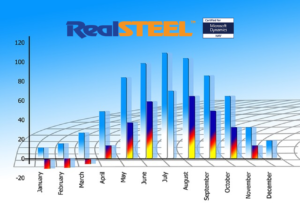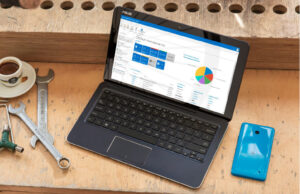
Running a successful metal fabrication business is about much more than metal framing, coil processing, and juggling the demands of customers and suppliers. All of these processes require accurate, real-time reporting, ongoing insights, and intelligent solutions to ensure the business continues to meet its accounting needs while keeping all of those departments ticking over.
How ERP Solutions Support Accounting and Finance Departments
An ERP solution is a complete system that provides access to all areas of the company and uses a series of integrations to offer specific benefits, whether it’s automating supply orders and ensuring inventories are well-stocked, assisting with manufacturing aspects like multi-line processing software and metal nesting software, or supporting the work of the finance department.
All of this information is presented as a single source of truth accessible by all departments and updated in real-time. Here are a few of the ways that using ERP can support accurate and efficient accounting and financing for a metal fabrication business:
Streamlined Data Entry
Data entry is a big part of any modern manufacturing business. Data is traditionally entered and organized via several points, with all departments playing a role in keep their respective divisions organized. But this can make it difficult to see the bigger picture and cause confusion when that data doesn’t properly align.
ERP systems use a series of automated processes to collect and organize data from across the company into a single source. It’s accurate and consistent, and employees don’t need to waste time rekeying data from one system into another.
It also makes data security easier, as there is only one source to consider, and all employees can be trained in the proper use of the system to maintain its integrity.
Business Intelligence
Business intelligence is used to provide clear, user-friendly graphs, charts, and dashboards, displaying important information and key metrics clearly and consistently while flagging any potential issues to the relevant departments and employees.
Mistakes are easier to spot and managers can be alerted where there is anything that needs their attention, whether it’s a potential issue with one of the accounts, an unpaid invoice that is long overdue, or processes that need to be improved.
Robust Reporting
Once all relevant data has been collected, it needs to be presented in an actionable report, using up more vital resources that could be better utilized elsewhere. ERP solutions can be customized to automatically populate reports with the necessary data. Profit/loss statements and other financial reports can be created on a moment’s notice—a vital tool for keeping accounting teams updated on the business’s financial health.
Real-time Insights
Worried that you might be spending too much on stock or manufacturing? Concerned whether the current demand is high enough to keep your metal fabrication business operational? Need to look to the future by studying data from the past? ERP solutions can help with all of this and more. Financial departments can use real-time data insights and reports to monitor the health of the business and prepare for future growth.
Cost and Credit Management
Cost management solutions help businesses eliminate transaction fees and other unnecessary expenses, while credit management makes it easy to collect payments from clients and mitigate financial risks. Keep a close eye on all active credit policies and ensure that clients pay what they owe when they owe it.
Track and Improve Freight Costs
Improper freight management and poor tracking can delay orders, create backlogs, and increase shipping costs. Freight management solutions make it easier to match loads, loading more palettes onto trucks to reduce costly and inefficient freight.
Freight is one of the biggest expenses for manufacturing companies, and proper management and tracking are essential for continued success.
Profitability Insights
Determining profitability isn’t as easy as comparing material cost to the eventual sale price. There are numerous expenses that can reduce that margin, from machine costs to employee wages and freight. Costs and sale prices are also constantly fluctuating, so those margins change.
ERP solutions help financial departments stay on top of this information by calculating all of those costs and comparing them to the sale price. Using this information, employees can then determine if something needs to be changed, whether that means increasing the sale price, running fewer discounts, finding new suppliers, or optimizing the manufacturing or freight process.
Who Can Benefit from ERP Accounting Solutions?
We created RealSTEEL™ to assist companies along every link of the manufacturing chain, from coil splitters and metal fabricators to pipe and tube processors. We can help companies see their operations more clearly and manage all aspects of ordering, manufacturing, accounting, and customer relations with a single integrated program.
Simplifying Steel and Metal Accounting with ERP
According to a report by Glass Lewis, accounting errors by US businesses are on the rise, with estimates suggesting that these mistakes are costing companies billions of dollars a year. One mistake, whether it’s a misplaced decimal point or a simple oversight, can have a significant impact on a company’s finances, stressing the importance of proper preparation and more efficient and accurate accounting tools.
This is as true for the steel and metal industry as it is for any other, and it’s an issue that can be remedied with ERP integration. It simplifies all facets of a manufacturing business, from incorporating manufacturing tools like steel nesting software, metal fabrication software, and coil processing software to simplifying the ordering and manufacturing process.
It’s also something that can be adapted to suit the needs of a growing business.
To learn more about how an ERP integration can help your steel and metal fabrication business, read more about our all-in-one steel accounting and finance software and request a free demo.




